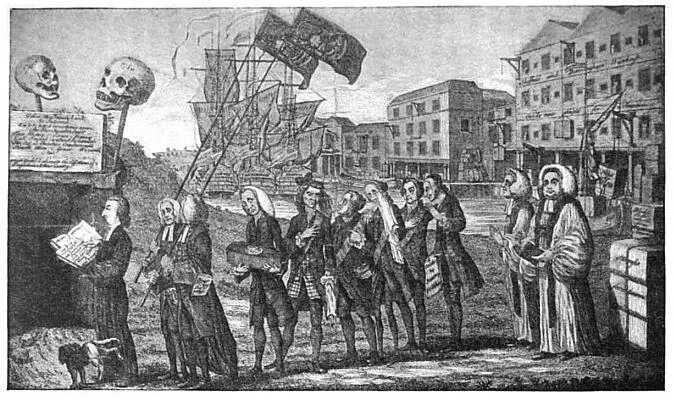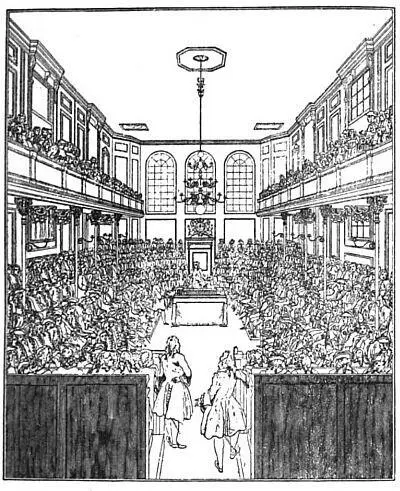John Fiske - The American Revolution
Здесь есть возможность читать онлайн «John Fiske - The American Revolution» — ознакомительный отрывок электронной книги совершенно бесплатно, а после прочтения отрывка купить полную версию. В некоторых случаях можно слушать аудио, скачать через торрент в формате fb2 и присутствует краткое содержание. Жанр: История, foreign_antique, foreign_prose, на английском языке. Описание произведения, (предисловие) а так же отзывы посетителей доступны на портале библиотеки ЛибКат.
- Название:The American Revolution
- Автор:
- Жанр:
- Год:неизвестен
- ISBN:нет данных
- Рейтинг книги:4 / 5. Голосов: 1
-
Избранное:Добавить в избранное
- Отзывы:
-
Ваша оценка:
- 80
- 1
- 2
- 3
- 4
- 5
The American Revolution: краткое содержание, описание и аннотация
Предлагаем к чтению аннотацию, описание, краткое содержание или предисловие (зависит от того, что написал сам автор книги «The American Revolution»). Если вы не нашли необходимую информацию о книге — напишите в комментариях, мы постараемся отыскать её.
The American Revolution — читать онлайн ознакомительный отрывок
Ниже представлен текст книги, разбитый по страницам. Система сохранения места последней прочитанной страницы, позволяет с удобством читать онлайн бесплатно книгу «The American Revolution», без необходимости каждый раз заново искать на чём Вы остановились. Поставьте закладку, и сможете в любой момент перейти на страницу, на которой закончили чтение.
Интервал:
Закладка:
The result finally reached was the unconditional repeal of the Stamp Act, and the simultaneous passage of a Declaratory Act, in which the views of Pitt and Camden were ignored and Parliament asserted its right to make laws binding on the colonies “in all cases whatsoever.” By the people of London the repeal was received with enthusiastic delight, and Pitt and Conway, as they appeared on the street, were loudly cheered, while Grenville was greeted with a storm of hisses. In America the effect of the news was electric. There were bonfires in every town, while addresses of thanks to the king were voted in all the legislatures. Little heed was paid to the Declaratory Act, which was regarded merely as an artifice for saving the pride of the British government. There was a unanimous outburst of loyalty all over the country, and never did the people seem less in a mood for rebellion than at that moment.
The quarrel had now been made up. On the question of principle, the British had the last word. The government had got out of its dilemma remarkably well, and the plain and obvious course for British statesmanship was not to allow another such direct issue to come up between the colonies and the mother-country. To force on another such issue while the memory of this one was fresh in everybody’s mind was sheer madness. To raise the question wantonly, as Charles Townshend did in the course of the very next year, was one of those blunders that are worse than crimes.

FUNERAL PROCESSION OF THE STAMP ACT
In July, 1766, – less than six months after the repeal of the Stamp Act, – the Rockingham ministry fell, and the formation of a new ministry was entrusted to Pitt, the man who best appreciated the value of the American colonies. But the state of Pitt’s health was not such as to warrant his taking upon himself the arduous duties of prime minister. He took the great seal, and, accepting the earldom of Chatham, passed into the House of Lords.

The Duke of Grafton became prime minister, under Pitt’s guidance; Conway and Lord Shelburne were secretaries of state, and Camden became Lord Chancellor, – all three of them warm friends of America, and adopting the extreme American view of the constitutional questions lately at issue; and along with these was Charles Townshend, the evil spirit of the administration, as chancellor of the exchequer. From such a ministry, it might at first sight seem strange that a fresh quarrel with America should have proceeded. But Chatham’s illness soon overpowered him, so that he was kept at home suffering excruciating pain, and could neither guide nor even pay due attention to the proceedings of his colleagues. Of the rest of the ministry, only Conway and Townshend were in the House of Commons, where the real direction of affairs rested; and when Lord Chatham was out of the way, as the Duke of Grafton counted for nothing, the strongest man in the cabinet was unquestionably Townshend. Now when an act for raising an American revenue was proposed by Townshend, a prejudice against it was sure to be excited at once, simply because every American knew well what Townshend’s views were. It would have been difficult for such a man even to assume a conciliatory attitude without having his motives suspected; and if the question with Great Britain had been simply that of raising a revenue on statesmanlike principles, it would have been well to entrust the business to some one like Lord Shelburne, in whom the Americans had confidence.
In 1767, Townshend ventured to do what in any English ministry of the present day would be impossible. In flat opposition to the policy of Chatham and the rest of his colleagues, trusting in the favour of the king and in his own ability to coax or browbeat the House of Commons, he brought in a series of new measures for taxing America. “I expect to be dismissed for my pains,” he said in the House, with flippant defiance; and indeed he came very near it. As soon as he heard what was going on, Chatham mustered up strength enough to go to London and insist upon Townshend’s dismissal. But Lord North was the only person that could be thought of to take Townshend’s place, and Lord North, who never liked to offend the king, declined the appointment. Before Chatham could devise a way out of his quandary, his malady again laid him prostrate, and Townshend was not only not turned out, but was left practically supreme in the cabinet. The new measures for taxing America were soon passed. In the debates on the Stamp Act, it had been argued that while Parliament had no right to impose a direct tax upon the Americans, it might still properly regulate American trade by port duties. The distinction had been insisted upon by Pitt, and had been virtually acknowledged by the Americans; who had from time to time submitted to acts of Parliament imposing duties upon merchandise imported into the colonies.
Nay, more, when charged with inconsistency for submitting to such acts while resisting the Stamp Act, several leading Americans had explicitly adopted the distinction between internal and external taxation, and declared themselves ready to submit to the latter while determined to resist the former. Townshend was now ready, as he declared, to take them at their word. By way of doing so, he began by laughing to scorn the distinction between internal and external taxation, and declaring that Parliament possessed the undoubted right of taxing the Americans without their own consent; but since objections had been raised to a direct tax, he was willing to resort to port duties, – a measure to which the Americans were logically bound to assent. Duties were accordingly imposed on wine, oil, and fruits, if carried directly to America from Spain or Portugal; on glass, paper, lead, and painters’ colours; and lastly on tea. The revenue to be derived from these duties was to be devoted to paying a fixed salary to the royal governors and to the justices appointed at the king’s pleasure. The Crown was also empowered to create a general civil list in every colony, and to grant salaries and pensions at its arbitrary will. A board of revenue commissioners for the whole country was to be established at Boston, armed with extraordinary powers; and general writs of assistance were expressly legalized and permitted.

HOUSE OF COMMONS
Such was the way in which Townshend proceeded to take the Americans at their word. His course was a distinct warning to the Americans that, if they yielded now, they might expect some new Stamp Act or other measures of direct taxation to follow; and so it simply invited resistance. That no doubt might be left on this point, the purpose for which the revenue was to be used showed clearly that the object of the legislation was not to regulate trade, but to assert British supremacy over the colonies at the expense of their political freedom. By providing for a civil list in each colony, to be responsible only to the Crown, it aimed at American self-government even a more deadly blow than had been aimed at it by the Stamp Act.
It meddled with the “internal police” of every colony, and would thus have introduced a most vexatious form of tyranny as soon as it had taken effect. A special act by which the Townshend revenue acts were accompanied still further revealed the temper and purposes of the British government. The colony of New York had been required to provide certain supplies for the regular troops quartered in the city, under command of General Gage; and the colonial assembly had insisted upon providing these supplies in its own way, and in disregard of special instructions from England. For this offence, Parliament now passed an act suspending the New York assembly from its legislative functions until it should have complied with the instructions regarding the supplies to the army. It need not be said that the precedent involved in this act, if once admitted, would have virtually annulled the legislative independence of every one of the colonial assemblies.
Читать дальшеИнтервал:
Закладка:
Похожие книги на «The American Revolution»
Представляем Вашему вниманию похожие книги на «The American Revolution» списком для выбора. Мы отобрали схожую по названию и смыслу литературу в надежде предоставить читателям больше вариантов отыскать новые, интересные, ещё непрочитанные произведения.
Обсуждение, отзывы о книге «The American Revolution» и просто собственные мнения читателей. Оставьте ваши комментарии, напишите, что Вы думаете о произведении, его смысле или главных героях. Укажите что конкретно понравилось, а что нет, и почему Вы так считаете.












